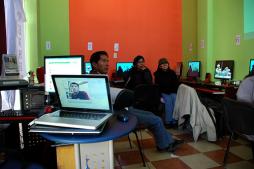This week, the US Center on Citizen Diplomacy is hosting the U.S. Summit for Global Citizen Diplomacy in Washington, DC. in partnership with over 1,000 NGOs conducting citizen diplomacy activities. MobileActive.org is participating in a roundtable discussion on the Role of New Media in Advancing Citizen Diplomacy. The panel will address both policy recommendations and recommended tools for facilitating the use of new media in citizen diplomacy. A live webcast of selected Summit sessions will be available here beginning Wednesday.
As part of the roundtable, we were involved with the production of a report on the role of new media in citizen diplomacy which is available for download. The report provides an overview/taxonomy of how new media tools and strategies have facilitated citizen diplomacy in the last 10-15 years, recommendations for how these tools and strategies can be used effectively in the future, and policy recommendations to support an enabling environment for integrating new media more seamlessly into global projects and programs.
While the report is intended for a less tech-savvy audience interested in simply gaining a cursory understanding of what is possible with new media and connective technologies (i.e.- the report does not include strategic evaluations or technical guidance/analysis), below are some highlights:
I. New media's role in citizen diplomacy
The report identifies at least 6 thematic areas where connective new technology/new media has a role in citizen diplomacy, including the following:
- Virtual Exchanges
- Communities of Practice/Networks of Common Interest
- Facilitating Dialogue & Sharing Media
- Crowdsourcing Solutions
- Conflict Transformation
- Advocacy and Virtual Support for Global Social Causes
Mobile technology has played and can play a significant role in many of these areas. Mobiles have been used by citizens around the world as a tool for expression (such as Mobile Voices, a citizen media project which allows immigrant workers to create and share stories about their lives and communities directly from cell phones), and for advocating and mobilizing for international causes (such as the 1GOAL campaign for global education during the FIFA World Cup in 2010, or Greenpeace's first use of SMS in India as part of a campaign to raise environmental awareness). We have also seen instances of mobile technology to match volunteers, to provide jobs, and to fundraise, among others.
In the near future, logical and strategic uses of mobile technology may emerge in areas which we have not yet seen. For example, to enable interactions and dialogue between societies in conflict, or to link cross-border professional peer groups over mobile-social networking applications. And, as global mobile penetration continues to rise, expect to see more citizen diplomacy initiatives seeking ways to integrate mobile into their programming as a means to engage with previously disconnected communities.
II. Communities of Practice
Like professional foreign exchanges, convening across borders around professional common interests is a long-standing form of citizen diplomacy. Several networks that have an inherent tech focus also use new technologies to communicate and share knowledge regularly. And indeed, the MobileActive.org network itself is an example of such a global community of peers and practitioners convening around a common interest: mobiles for social impact.
Most everyone in the MobileActive.org community is inherently a citizen diplomat, and many of the social change organizations we work with and collaborate with are referenced in the report. Some of the organizations profiled include:
Soliya; Digital Democracy - Project Einstein; Live Mocha; Alliance for Youth Movements; I Know Politics; Crisis Mappers; BarCamp; Global Voices Online; IndyMedia; Small World News; Meedan.net; Ushahidi; Access Now; SamaSource; One Voice Movement; MidEast Youth; VideoLetters Project; Genocide Intervention Network (GI-Net); Save Darfur; iACT; Invisible Children; One Million Voices Against FARC; Survivors Connect; Avaaz.org.
III. Recommendations
Two of the recommendations outlined in the paper touch specifically on issues which we regularly keep in mind and advocate for. One of has to do with the barriers to broader adoption of mobile for social impact work:
'"Barriers include the complex pricing (mobile phone fees are extremely expensive in some countries) and technical disparities between mobile platforms & operators in various countries. Government and business leaders should play a role in advocating for more “fair mobile” practices with regard to pricing and taxes, and interoperability so to more easily allow for social and humanitarian initiatives over mobile."
Another of the recommendations has to do with identifying common and appropriate standards of behavior in the field of new media/ICTs:
"Given the limited use of new media for citizen diplomacy purposes, there are little to no standards for how it should be used. Issues may include best practice for running or moderating online discussion groups, basic standards and awareness of international telecommunications laws, appropriate use and dissemination or endorsement of commercial or open-source technologies internationally, etc."
While only touched upon briefly in the report, this final point is a critical one - particularly as the line between citizen diplomacy, charity and international development/aid can easily become blurred.
A great deal has been learned by the broader new media & mobile tech community over the past 10 years, and we would be remiss not to share those experiences and heed lessons learned by practitioners. MobileActive.org endeavors to contribute to this institutional memory by being a resource to help demystify mobile technology for social impact, and reduce the learning curve for new players by sharing knowledge & learnings from our collective mistakes in ICT4D and M4D.
Why? Because the importance of being strategic, well-thought and responsible when designing and implementing tech-enabled programs which affect foreign societies (whether for development or citizen diplomacy) cannot be understated.
Image of Voces Bolivianas Workshop courtesy Flickr user Oso.

Post new comment